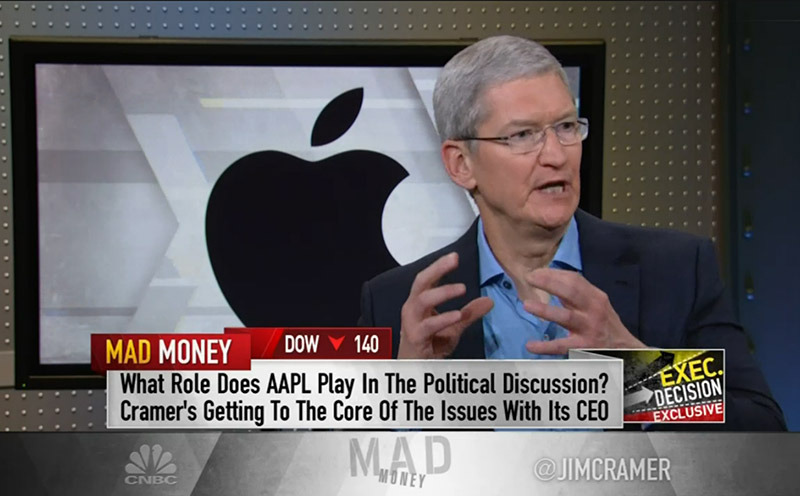In the second and final segment of a rare one-on-one interview with CNBC's Jim Cramer, Apple CEO Tim Cook discussed his company's core tenets, the recent debate over encryption, his personal legacy and more.
Cook offered little in the way of new information during the "Mad Money" clip on Tuesday, but did confirm Apple is committed to changing the world by delivering products that empower users. For example, Apple recently profiled a young autistic man named Dillon who relies on iPad to communicate with the world around him. The company produced a commercial chronicling Dillon's life, which Cramer referenced during today's broadcast.
"I'm most proud of the products that Apple makes that give our customers the ability to do things they couldn't have done," Cook said, listing out a number of tools like FaceTime and iPad in education.
For Cook, Apple is motivated not by sales, but by a fundamental need to effect change through technology. To go along with that lofty goal, Apple upholds a certain set of morals and business practices, from environmentally friendly production to workplace inclusion and consumer privacy. While some initiatives were established under late cofounder Steve Jobs, Cook has helped Apple's extracurricular activities flourish, prompting other tech companies to follow suit.
In some cases, however, Apple's political leanings, guided by Cook and other top executives, make the company a very large target for critics. The most recent example is Apple's court battle with the Federal Bureau of Investigation. The Department of Justice earlier this year pressed Apple to create a software bypass that would grant investigators access to an iPhone 5c used by San Bernardino shooter Syed Rizwan Farook, but the company resisted, saying such an action would put millions of users at risk.
"And so that was a bridge we thought we shouldn't cross that was not good for America," Cook said. "And so we stood up and we said, 'We're not going to do this,' and so they decided they would sue."
He added that Apple had to stand up for its beliefs, namely consumer privacy, and trust the system to reach the correct conclusions. As in past comments on the matter, Cook said the wider encryption debate needs to be discussed and decided upon by lawmakers and experts, not courts.
Finally, when asked about his legacy and those people he looks up to, Cook said he has "incredible love and respect" for Jobs. Historical figures who fought for human rights like Robert Kennedy and Martin Luther King, Jr. also play a big role in Cook's worldview.
 Mikey Campbell
Mikey Campbell







-m.jpg)






 Malcolm Owen
Malcolm Owen
 Amber Neely
Amber Neely


 Christine McKee
Christine McKee

 Chip Loder
Chip Loder
 Marko Zivkovic
Marko Zivkovic









7 Comments
Cook's hand motions when he speaks are prime targets for silly Photoshopping. In this article's image I would place a crystal ball between his hands...
I think Cook's a great leader, but I also wonder if these political/social distractions have led to one or two missteps.
Tim is doing as good as most anyone could regarding running Apple. And regarding privacy he's becoming a bit of a hero.
Tim is going to win. Period. Steve Jobs saw something in him and that's why he put him in this position. Maybe it was some of the compassion that Tim had that Steve sort of lacked. However, Steve was smart enough to see that moving forward, maybe we all could use a little compassion. He's not perfect but I feel he's done a good job. I'd like him to tell people to go pound sand more often, but that's not how he operates.